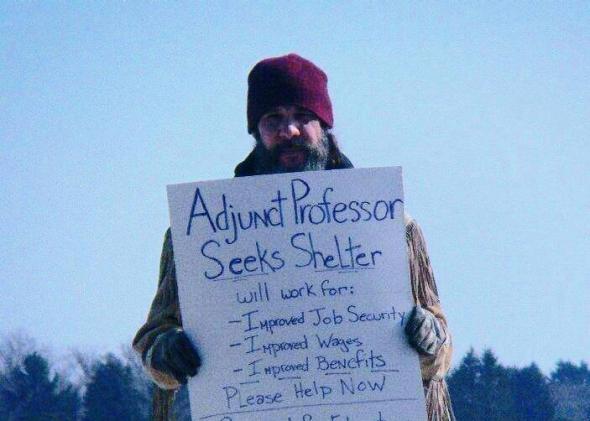
By Ryan Jackson | Gordon-Conwell Theological Seminary
As a student, I always suspected adjunct professors were personae non gratae among the serious academic community. This perception, I now believe, is the impression of a sophomoric imagination.
In my lengthy career as an impoverished student— a career I might have gladly extended had the remuneration been more favorable—I avoided adjunct professors like the plague. I viewed them as an unfortunate cross between a substitute and an assistant gym teacher. They clearly are not going to be around long, and they probably can’t play in the big leagues. The exception to my rule (to avoid adjuncts) came in those cases when I cared not a whit about the subject matter of a required course. In those cases, I would sacrifice my zeal for pure and undefiled learning on the altar of semestral expediency.
Now that I have been forced from my erstwhile career path and into a more ontological epistemology (a.k.a. the “real world”), I hold a somewhat different view of the adjunct. The seeds of this rehabilitated image were planted in my own unexpectedly positive experiences with the “academic outcasts.” In a word, I discovered that adjuncts could bring an important context to the classroom that was sometimes missing in classes taught by more institutionally stable figures.
By context I mean a set of important life experiences that adjuncts often bring to the table. Adjunct professors—particularly those who are bivocational— live not only in the ethereal world of philosophy and theory, but also in the concrete world of practice. Many are forced to reconcile the highest levels of learning with experiential realities in ways that full-time academics typically do not have to address.

My own experience brings an additional layer of context to my role as an adjunct. As a full-time pastor, I live constantly in two worlds. I live in the world of the academy as well as that of the church. There are points of connection between these worlds, but they obviously are not the same.
As a pastor, I want to bring the people I have the privilege of shepherding into unspoiled pastures with undiluted waters; my primary goal is not simply to inform the mind, but to help lead toward transformation of the whole person. This concern leads me to ask questions and approach subjects from perspectives that enhance my function in the classroom. Many professors, to be sure, also aim to foster transformative growth. Scholars who can both inspire the mind and energize the soul tend to be people attuned to the vicissitudes of ordinary life. The broader communities in which adjuncts operate enrich them with helpful awareness of practical concerns.
Of course, none of this is meant to minimize the full-time scholarly community, but it could help encourage a professor of any status who might sometimes feel like an educational appendage. I have been fortunate to experience open arms from colleagues in the academy. I have also sensed relief (and sometimes surprise) from students who value the personal connection we make—a connection, I believe, made more natural by a sense of shared experience.
 Ryan Jackson (PhD, Cambridge) is interested in theology, biblical studies, spiritual formation, and church leadership.
Ryan Jackson (PhD, Cambridge) is interested in theology, biblical studies, spiritual formation, and church leadership.
This article first appeared in Didaktikos, the journal of Theological Education. Didaktikos is a professor-to-professor journal that covers important advances in theological education in a user-friendly format. Subscriptions to Didaktikos are free for educators in theological education, who will also receive a 20% discount on Logos Bible Software. Go here to find out more.





[…] via Personae non Gratae? The Precarious Adjunct Life — theLAB […]
Brilliant. Thanks for posting. The other side of the same coin is some of us who have been pastors for decades would love to pass on our experience but never seem to find opportunity.
Hi Matthew. Thanks for your response! You’re exactly right! I would love to see more practitioners invited into the classroom in seminaries where the goal is not strictly academic but where we aim to train people for ministry. I hope you get the opportunity to do that!
Well said Ryan, and may your tribe flourish in the church and in academia. The problem of turning to adjunct positions may be painful, and the forerunners in this movement will have to bear a lot of that pain. But it may seed the church with better Pastor-Teachers that balance the all-too common CEO-ish pastor. And it may seed the academic environment of biblical studies with approaches that are more immediately regenerative and life-sustaining for prof and student, and those who walk through life with them. I exhort you: Take your best efforts to both environments and see what God will do.
Dale,
Thanks for your response! I appreciate your exhortation. Perhaps the most difficult thing with the journey I’m on is maintaining a full head of steam on both fronts! Nevertheless, I believe it to be essential for this journey to be successful to produce high quality scholarship as well as high quality practical work. Attempting those things and keeping spiritual and emotional balance has been an interesting!
Kind Regards,
Ryan
Amusingly, I sought out adjunct professors as they were often brilliant scholars with foreign credentials that did not translate well into the Western degree system or they were spouses who followed their spouse and were unable yet to find an appropriate position. In addition, I come from a family that made little distinction between academic scholarship and avocational scholarship – a great-grandfather minister also edited the first anthropology journal in the US. What would make a fascinating follow-up article is a reflection on the source of your assumptions.
MJ,
I’m glad to hear your approach was different from mine! I think the source of my assumptions was simply naiveté about the best source of learning. I’d like to explore this a bit more, but I think you’re onto something with your reflection on your background. In my experience there was a great deal of distinction between scholarship and “the real world.” Perhaps that influenced my leanings?
Thanks!
Ryan
Great insights. When I started classes at Moody Graduate School all courses were co-taught by an academician and an practictioner. Economics brought that plan to an end and changes have been (and continue to be made) to ensure economic viability of the school. Rather than view adjunct as “rent-a-prof”, your perspective needs to be promoted near and far.
David,
Thanks for your response! What a GREAT program Moody had! I wasn’t aware of places that did that with any degree of regularity. I’m glad they did, and I’m sad it ended. Maybe we can see an increase in the value of that approach as this perspective gains exposure. Spread the word!
Kind Regards,
Ryan
This was good, though not surprising. I have an article I’ll send you on some horrific statistics of those carrying a PhD diploma and how many fare in the real world vs dream world of academia. I sometimes share it with my master’s students so they don’t go into a doctorate with blinders on, but if called, will still pursue it despite the sorry stats for full time employment. Check this out:
On PhD
https://www.online-phd-programs.org/adjunct-crisis/
Wow, Dr. Z! Thanks for the article you shared. It is shocking, and totally true to my own experience! Yikes! I hope that we can come to a place of truly valuing education and supporting educators!
Kind Regards,
Ryan
This is a good word. I’m an adjunct professor and pastor (church planter). I’m grieved at how little tacit knowledge many of my professors passed on to my peers and I in my studies. As an adjunct living in two worlds I believe I’m better “equipped to equip” than I would be otherwise.
Daniel,
EXACTLY! It’s easy to retreat to the ethereal world of philosophy or theory without engaging in practical work for the good of the people of God. I’m really encouraged by your efforts. I believe that good and right thinking (orthodoxy) is vapid without orthopraxy! May the Lord bless your labor in both arenas!
In Him,
Ryan